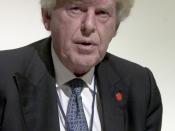1.Introduction
The European Central Bank (ECB) is a part of the attempt at European Monetary Union (EMU) and is the single locus of the European System Central Banks (ESCB), which has been formed from the voluntary union of national central banks, and the ECB itself. The National banks, like the Bundesbank, have however not been abolished. They merely become operating arms of the ECB. The ECB assumes responsibility for EU monetary policies, but it is the Council of Ministers and the not the ECB which is empowered to conclude agreements on the exchange rate systems in relation to non-EU currencies and to change the central rates for the single currency within the system. Therefore, for the exchange rate, it rests with the Council of Ministers and not the ECB.
Through establishing the ECB, all foreign exchange controls have been removed, exchange rats are irrevocably fixed and national currencies would eventually be replaced by a single currency, as it did happen from the 1.1.2000
with the Euro.
The primary objective of the ECB is to maintain price stability, using whatever monetary policy is necessary regardless of the costs involved in unemployment. Furthermore, the ECB will support the Unions objectives with the framework of free-market principles.
These objectives are:
÷The ECB is completely independent of the institution of the Union and member state governments.
÷It has got political independence, in which consists of free-market notion that the main danger to financial stability is not the activities of market agents but the workings of elected governments, which makes necessary an independent check on public spending.
÷The ECB is given the responsibility for avoiding the inflationary finance of governments deficits, this becoming an instrument of control on government and not an agent of economic policy.
2.Arguments for an Independent Central Bank
The argument I am considering in favour of the ECB, is the Euro, which is just the argument in favour of any independent central bank, with the added element that the ECB will be more independent than most other independent central banks.
Firstly, one argues that, in the short-term, there is a trade-off between unemployment and unexpected inflation. That is, if inflation is higher than economic agents expect, then the price rises they will appear to involve real increases in value. Therefore, when production becomes more valuable firm will produce more. Which means, that output will be higher and unemployment lower.
Therefore, since governments are more popular when unemployment is lower and output is higher, that means that governments have an incentive to create unexpected inflation. However, economic agents act rational and are also not stupid. That is since governments have an incentive to pursue unexpected inflation, economic agents will take account of this. This means that even the most prudent government will not pursue secret inflationary policies, inflationary expectation will reflect the risk that it might. Nevertheless, this means that this inflationary bias will be reflected in a need for higher interest rates and higher inflation.
However, since inflation and interest rates are raised, governments can create inflation secretly. The obvious solution for this problem would be to take that power away from the government. The most powerful influence on inflation in the short-term is monetary policy. Thus, by taking monetary policy away from governments and giving it to an independent central bank (e.g. the Bundesbank), one would expect to have lower inflationary expectations and to require lower interest rates to implement monetary policy.
My second argument, I wanted to point out, is the inflationary performance of countries with independent central banks. The most obvious example for that one is the Bundesbank, but there are of course also many other countries in the world with independent central banks. The inflationary performance of these countries has almost always been better than the inflationary performance of countries with democratically controlled banks. Furthermore, to point out, long-term interest rates, which reflect inflationary expectations, did indeed fall in the UK after the Bank of England was given operational independence.
I have also observed that countries with independent central banks have lower inflation. This claim raises what economist call "a problem of causality". Cause and effect can be difficult to disentangle. Is it that countries with independent central banks have low inflation? Or is it that countries with low inflation have independent central banks? Or is it that there is something about these countries which creates both the independent central bank and the low inflation?
One might argue, that in the case of Germany, we have a country, which, twice in about 20 years, faced social collapse through hyper-inflation and therefore developed a very high anti-inflationary attitude. Through out society one manifestation of this anti-inflationary attitude might be low inflation. Another manifestation might be the Bundesbank.
I shall now present argument against independent central banks.
3.Arguments against Independent Central Banks
3.1Co-ordination of economic policy
This is a very old and probably also one of the most famous arguments, that monetary and fiscal policy would work best if they were working together. If fiscal and monetary policy are not co-ordinated, if they are not working together as part of some overall strategy, then economic policy as a whole will not be as effective. But, if monetary policy is run by an entirely separate and independent institution it therefore cannot be co-ordinated with fiscal policy or indeed with any other part of government economic policy, such as labour market policy or industrial policy. Fiscal and other economic policies have an effect on inflation, so not even inflation will have a co-ordinated policy.
3.2The incentive for government to avoid inflationary policies
Another argument, would be if the central bank is put in charge of keeping down inflation the government will consider that controlling inflation is someone else's job. This means that the government can pursue expansionary fiscal policies, or other inflationary policies, without fearing that it will be blamed for the consequent inflation. The best example for this is the period of German unification after the fall of the Berlin Wall. German Unification and a large budget deficit were pursued by the government, while the Bundesbank was expected to keep down inflation.
The consequences of this were that, given that many policies cause inflation are popular apart from their inflationary consequences, since the consequent inflation can be blamed on someone else an inflationary bias is introduces into the system precisely by having an independent central bank. That is, having an independent central bank leaves the government an incentive to pursue inflationary policies.
3.3Central Banks are Conservative
In these days appropriate monetary policy basically means appropriate interest rates policy. Appropriate interest rate policy depends on a number of things. Let us just look into one: unemployment. There are always some people changing jobs or retraining. Therefore some unemployment is entirely natural. The amount of unemployment which is considered natural is called the 'natural rate of unemployment' (NRU).
However, if current unemployment is above the NRU then that is a source of deflationary pressure. The extra unemployment people will be looking for jobs. In other words, the higher deflationary pressure there is, the lower interest rates will be.
In contrast to the above, if unemployment is below the NRU, that is a source of inflationary pressure. There are enough people switching between jobs, and there is not enough retraining going on, so workers are scarce. Since there are scarce their wages will be bid up, meaning higher production cost and also higher prices. This means, that if we have higher inflationary pressure, we will therefore have low interest rates.
Suppose we could somehow reduce the NRU. That would mean that for any given level of unemployment, we should have interest rates lower than they would be if the NRU had not changed. Next, suppose the government pursues policies intended to reduce the NRU. The government claims these policies will reduce the NRU, but the political opposition claims that they will not, and opposes them . This clearly states, that these policies are a source of political controversy.
Now suppose that an independent central banker deciding interest rate policy. Clearly it would be inappropriate for them to assume that the government's policies have reduced the NRU until there is compelling evidence to this effect.
Therefore, this means, that during this period in which the government might believe, rightly, that its policies have been successful in reducing the NRU. An independent central bank will keep interest rates high until the lower NRU has been proven. Since central banks inevitably lag the political debate in this way, an independent central bank's interest rate policy will inevitably not reflect the possible effectiveness of controversial and unproven government policies.
This conservativeness of independent central banks means that they may often pursue inappropriate policies and that is another reason why it is not a good idea to have an independent central bank. Politicians might legitimately disagree with the central bankers for reasons other than wanting to increase inflation.
One classic example of my last point I made happened in the UK in 1996 and early 1997. Chancellor Kenneth Clarke believed that inflationary pressure was low, reflecting this view that the economy could sustain lower unemployment and higher economic growth than in the past, because of the economic reforms which the Conservatives had pursued. In contrast, Eddie George, governor of the Bank if England, argued that inflationary pressures were growing, reflecting the view that there was little evidence that anything had changed significantly about the NRU or the sustainable growth rate. This difference of opinion was reflected in different views about appropriate interest rate policy.
4.Conclusion
One very strong argument in favour of the Euro is that it implies a central bank which is extremely independent of political control. I have listed a few arguments in favour of independent central banks:
÷An independent central bank is free from political manipulation. It can devote itself to attaining long-run economic goals, rather than to helping politicians achieve short-run economic success in time for the next election.
÷Independence may strengthen the credibility of monetary policy. This may then play an important part in shaping expectations: workers may put in moderate wage demands and businesses may be more willing to invest.
÷An independent central bank like the Bundesbank has a clear legal status and set of responsibilities. It is the protector of the currency and as such it is not subordinate to government. This is important given the political nature of economic policy making in both a domestic and an international context.
Here I am going to present four arguments against independent central banks.
÷That independent central banks undermine the co-ordination, and therefore the effectiveness of economic policy.
÷That if controlling inflation is left to monetary policy exercised by a central bank the government has an incentive to pursue inflationary policies in other areas.
÷That output inflation tradeoffs are genuine political decisions, and should be under democratic control.
÷That central banks are intrinsically conservative, and that politicians might disagree with central banks about appropriate monetary policy without wanting to increase inflation.
In my few, the arguments against an independent central bank outweigh those in favour.
5.Bibliography
÷Essential of Economics, by John Sloman
÷Monetary Economics, by M. Lewis & P. Mizen
÷International Business; Theories, Policies and Practices; by Monir Tayeb
÷Economics, 3rd Edition, by M. Parkin & M. Powell and K. Matthews
÷International Financial Management, 2nd Edition, by Eun & Resnick
÷Various FT's
÷Notes from Lectures and Tutorials
(Words 1.986)


